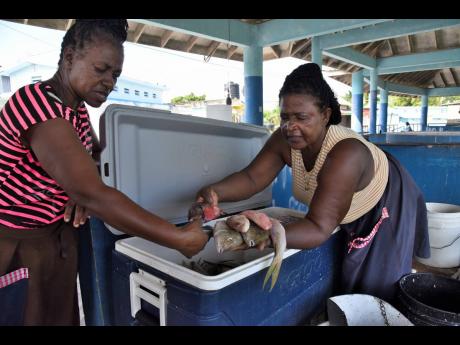EMPTY HOOK
Vendors say livelihoods on the line as customers ditch local fish for imported stock
FISH VENDORS of Black River in St Elizabeth have expressed disappointment over a low demand for local catches, stating that many citizens prefer to purchase imported stock in supermarkets. The fish vendors, who operate in the Black River fish...
FISH VENDORS of Black River in St Elizabeth have expressed disappointment over a low demand for local catches, stating that many citizens prefer to purchase imported stock in supermarkets.
The fish vendors, who operate in the Black River fish market, told The Gleaner that this lack of consumer interest in supporting local businesses is threatening their livelihood.
“The imported fish a lick we fi six,” one vendor said, summing up the situation in dramatic fashion.
Many of the vendors said they have been engaged in this trade for nearly half a century and sell a wide range of fish, including parrot, yellowtail, jack, snapper, and grunt.
“Dem carry in some ugly imported grunt weh dem a sell fi all $300 a pound,” said Patsy Forbes, a fish vendor for over 40 years.
She argued that the quality of fish sourced locally was much better than what was being imported.
Forbes stated that even if the local variety was a bit more expensive than the imported fish, people were still getting value for money because the vendors were charging $1,000 per pound for an assortment bag of fish.
Floyd Green, minister of agriculture, fisheries and mining, told The Gleaner that the cries of the vendors spoke to the “reality ... that a number of our fishers have been facing increased cost in plying their trade”.
He stated that while he would need to investigate the specifics of the situation at the Black River fish market, over the years, the fishing industry has encountered many obstacles related to its fish stock and dealing with overfishing.
This, he said, has resulted in the depletion of Jamaica’s nearshore fish stock.
As such, in order to obtain “reasonable catches” of quality, fisherfolk have had to venture farther out to sea.
Green stated that this was at a higher cost to them and so consumers would undoubtedly feel the pinch.
Sandra Linton Jones, another vendor, stated that the texture and taste of the grunt caught locally were superior to the ones from the United States.
“Fi dem grunt, the head hard and dem don’t eat like our grunt. These are the local grunt that catch in our Caribbean, but those, a container dem come in and dem have dem inna deep freeze so long, dem cyah fresh,” she reasoned.
The vendors said that their busiest business days were on Fridays and Saturdays due to their usual customers calling for an order.
“If customer nuh call we, we nuh have no business,” one said.
“You see, if the imported fish don’t stop, dog a go nyam our supper because this is our livelihood,” Forbes said.
The vendors also pointed towards the shift in consumer behaviour towards buying most – if not all – of their food items, including seafood and ground provisions, in stores and supermarkets as the reason for the decline in sales.
“Nobody nah come a market like one time,” one remarked.
Green noted that the ministry’s fishing incentive programme is expected to help cushion some of the costs as the fishers venture farther out at sea. The programme also aims to accelerate the pace of transitioning some of the country’s small-scale fishers to utilising deep line fishing technology, he said.
According to Green, this method, which comprised employing a long main line with baited hooks attached, would result in higher returns and lower production costs.
He added that under the programme, the fishers will get the appropriate training and equipment.
“Clearly, this year, the fishing incentive programme was a small one because it had to be carved out of reallocations, but next year, I want to put it as one of the priorities in the budget that we’ll get financing for so that we can provide greater support to our fishers,” he told The Gleaner.
With 18 fish sanctuaries across the island, Green emphasised the need for more such protected areas to replenish fish stock.
“We have seen the country doing better at keeping those sanctuaries and I think more and more fishers recognise that the sanctuaries help,” noting improvements in the species and quantities seen.
As Jamaica was recently elected chairmanship of the Western Central Atlantic Fishery Commission, Green said the Government will see how best it can advocate for more international support for small-scale fishers, noting that the problems expressed by vendors in the Black River fish market are commonplace in global markets.
“This is not just a Jamaica problem, but it’s actually an international problem with the cost of production going up,” he said.

